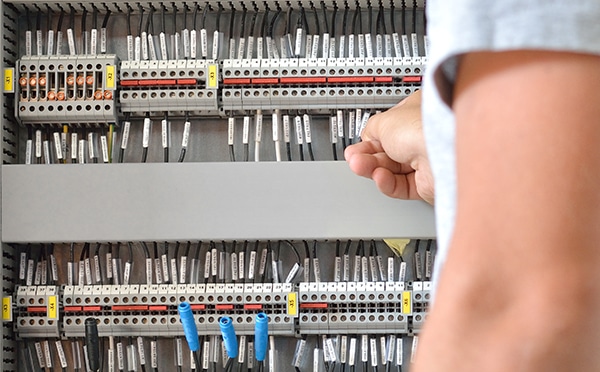Introduction
Electricity has become an essential part of our lives as it powers most of the everyday things we use, and yet if poorly managed, it can have devastating effects. Care homes use electricity to power lights, portable appliances, nurse call systems, CCTV systems and fire alarm systems to name a few. Whilst domestic homes use 230 volts, given the volume of electricity required for a care home, most have a 415 volts supply in the main plant room.
What Do I Need to Look Out For?
Routine audits and inspections of your establishment can identify areas of concern. Such hazards could be:
- Loose wiring of plugs particularly from items which get moved around like vacuum cleaners, floor polishers etc and faulty wiring on power tools and gardening equipment
- Residents’ rooms where cube type plugs or extension leads are overloaded
- Specialised beds with pressure pads which have cables etc
- Hairdressing driers
- Christmas tree lights which are left on continually
- Plant rooms, lift shafts, electricity cupboards and cellars which can be notorious for combustibles like paper files, cardboard boxes etc
- Wires and cables near water ie: kettles
- Portable heaters and trailing wires
- Plugs and plug sockets which are damaged or burn marks around the plug pins or socket outlets
- Metal surfaces which are not earth bonded or where the bonding is loose
- Contractors who need to drill into walls, ceilings or floors where live cables could be hidden
- Be particularly aware of any contractors on site working with electrics, ensuring that they are working to their agreed risk assessments and safe systems of work
- Be aware of cables which are taped up
What Risks do Electrics Pose?
The two main risks from electrics are:
- Fire from overloaded plugs, bare wires, combustibles which are close by
- Electric shock when in contact with water, incorrectly wired plugs or metal surfaces. Staff who are engaged in personal care, cleaners, kitchen staff and maintenance staff are most at risk
Both have the potential to kill.
Electric shock can significantly affect the heart as it passes through the body:
- Stopping the heart beating properly
- Preventing the person from breathing
- Causing muscle spasms
- Skin tissue burns
Fire can be caused as heat released from exposed wires encounters combustible materials, thus igniting them. Incorrectly wired electrics and items which need earth bonding overheat and likewise result in a fire. There is also the risk of toxic fumes being released. This is most noticeable around areas were paints, chemicals and particularly HFCs (aerosols) are found.
How do I Effectively Manage the Risk?
Key to managing electrics safely:
- Have staff trained in basic electrical safety awareness which alerts them to the dangers
- Ensuring the electrical work is only carried out by trained professional electricians (ie NICEIC registered, 17th Edition trained)
- Ensure that all portable electrical appliances are tested (PAT). This includes kettles, microwave ovens, computers, TVs, radios etc. Most items are tested annually, though equipment used in construction type works is usually recommended to be tested every 3 months
- Routine maintenance and external tasks ie: cutting the lawn, drilling etc should be connected to an (RCD) Residual Current Device which acts like a trip switch cutting off the power where there is a surge
- Cables must not be taped up. If they are cut they must be replaced, as exposed cables can cause a significant fire risk
- Routine checking for frayed wires which must be replaced
- Carefully store items which could be combustible ie: reams of paper away from heat sources
- Cellars, plant rooms, electricity houses must be compartmentalised and only have the equipment needed in place. They are NOT a storage area for combustibles, residents’ (who have left) belongings, a filing store or somewhere to store the Christmas decorations
- Having a designated COSHH storage area which is compartmentalised and lockable. These areas must not have exposed wiring and lighting must be sealed units which are fire rated
- Have a designated kitchen for staff and don’t allow toasters in offices
- In winter, portable heaters should not be a substitute for effective heating and must not have anything placed on them, have combustibles nearby, nor should they be left unattended
- Workstations must have cable tidies or concealed trunking for cables
- Extension leads must be kept to a minimum. Never plug an extension lead into another extension lead. Consider a programme of installing more hard-wired plugs
- All electrical equipment must be serviced by a qualified and competent engineer
- Fixed wire testing should be completed every 5 years by a qualified electrician and a certificate of conformity will be supplied. Managers must ensure any action points are addressed and closed out by a qualified electrician. This is not only a requirement for insurance, it is a requirement under the Electricity at Work Regulations 1989 (EWR89).
What is The Standard Required For Electrical Works?
All electrical work in the UK must comply with the EWR89 and the Health and Safety at Work Act 1974. HSE guidelines recommend:
For work on electrical installations below 1000 volts AC, you should be able to work within the guidelines set out in BS7671 ‘Requirements for electrical installations. IET Wiring Regulations. Seventeenth edition’. For details, see: British Standards Institution. Other work should be carried out according to the guidelines set out in the relevant industry standard.
Maintenance staff, unless they are qualified electricians, should leave this work to the experts as they pose a significant risk to themselves and others by their actions and misinformed experience.
Show me The Legislation!
All UK legislation is covered by the Health and Safety at Work Act 1974 (HASAW74 ) of which section 2 and section 3 are most commonly quoted. Electrical safety comes under the Electricity at Work Regulations 1989 (EWR89). Section 3 (1) which states:
“Except where otherwise expressly provided in these Regulations, it shall be the duty of every – (a) employer and self-employed person to comply with the provisions of these Regulations in so far as they relate to matters which are within his control.”
Section 3 (2) states:
“It shall be the duty of every employee while at work –
(a) to co-operate with his employer so far as is necessary to enable any duty placed on that employer by the provisions of these Regulations to be complied with; and
(b) to comply with the provisions of these Regulations in so far as they relate to matters which are within his control.”
This legislation, in many ways, is similar to that of HASAW74 in that the employer, employee and self-employed all have a duty to operate in a safe manner which does not unduly affect their safety and the safety of others by their action and omissions.
What the law requires of employers under HASAW74 section 2 (2) is:
“(a) the provision and maintenance of plant and systems of work that are, so far as is reasonably practicable, safe and without risks to health;
(d) so far as is reasonably practicable as regards any place of work under the employer’s control, the maintenance of it in a condition that is safe and without risks to health.”
Summary
In summing up, electricity if incorrectly used can be dangerous and even fatal. Having a system of planned maintenance and routine inspections can ensure that, as far as is reasonably practicable and if acted upon, plant and equipment are safe. Finally, it is the duty of the employer to ensure the safe maintenance of electrical equipment.
References
Electrical FAQs (HSE) http://www.hse.gov.uk/electricity/faq.htm
Electricity at Work Regulations 1989 (EWR89).
PAT – Portable Appliance Testing FAQs (HSE) http://www.hse.gov.uk/electricity/faq-portable-appliance-testing.htm
The Electricity at Work Regulations 1989 (HSR25) (HSE) http://www.hse.gov.uk/pubns/priced/hsr25.pdf







